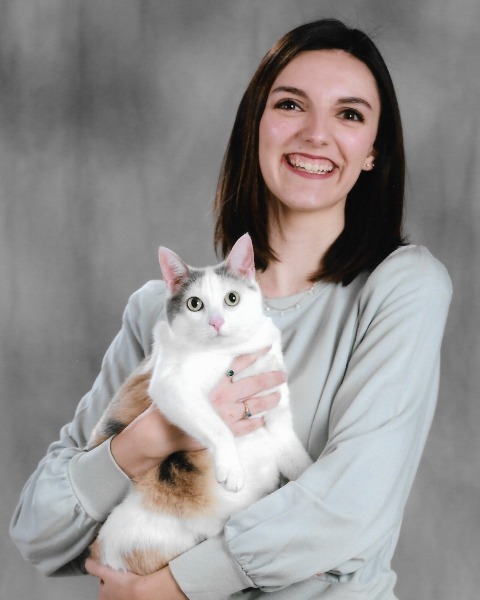Small Animal Internal Medicine
R03 - Using Probiotics to Modulate the Respiratory Microbiome in Feline Allergic Asthma
Friday, June 16, 2023
3:15 PM - 3:30 PM ET
Location: PCC 108B
CE: 0.25

Julia D. Remaks, DVM
Small Animal Internal Medicine Resident
University of Missouri Veterinary Health Center
Columbia, Missouri, United States
Research Abstract - Oral Presenter(s)
Abstract: Background- Feline asthma is associated with respiratory dysbiosis, correction of which could serve as a novel treatment.
Hypothesis/Objectives- We hypothesized that in asthmatic cats treated with anti-inflammatory glucocorticoids, probiotics would attenuate the asthmatic phenotype and beneficially alter respiratory, blood and oropharyngeal (OP) microbial communities and immune parameters versus placebo.
Animals- 13 client-owned asthmatic cats.
Methods- A randomized, blinded, placebo-controlled clinical trial of asthmatic cats receiving anti-inflammatory glucocorticoids with oral probiotics (PRO), or placebo (CONTROL) assessed airway eosinophilia and owner-perceived improvement at baseline and after 2 weeks of treatment. Bronchoalveolar lavage fluid (BALF), blood, and OP microbial communities were compared using 16S rRNA amplicon sequencing. Real-time PCR for transcription factors, activation markers and cytokines, and IgA ELISAs were used. Statistical analyses used two-way RM-ANOVA or PERMANOVA (significance, p< 0.05).
Results- There were no significant differences in mean±SEM BALF eosinophils (PRO, 45.6±7.51; CONTROL, 31.3±5.9) or improvement in owner-perceived clinical signs between groups. There was no significant difference in alpha- or beta-diversity in BALF, blood, and OP samples between groups or over time. There were no significant differences in CD25, foxP3, GATA, Helios, IL-4, IL-5, IL-10, IL-13, IL-17, IFN-γ or serum or BALF IgA between groups or over time.
Conclusions and clinical importance- In asthmatic cats, oral probiotics failed to reduce airway eosinophilia, improve owner-perceived signs, modify microbial community composition, or alter all assessed immune responses versus placebo or over time. Longer treatment, different composition or delivery (e.g., aerosolized) of probiotic, or larger number of cats would represent next stages of study.
Hypothesis/Objectives- We hypothesized that in asthmatic cats treated with anti-inflammatory glucocorticoids, probiotics would attenuate the asthmatic phenotype and beneficially alter respiratory, blood and oropharyngeal (OP) microbial communities and immune parameters versus placebo.
Animals- 13 client-owned asthmatic cats.
Methods- A randomized, blinded, placebo-controlled clinical trial of asthmatic cats receiving anti-inflammatory glucocorticoids with oral probiotics (PRO), or placebo (CONTROL) assessed airway eosinophilia and owner-perceived improvement at baseline and after 2 weeks of treatment. Bronchoalveolar lavage fluid (BALF), blood, and OP microbial communities were compared using 16S rRNA amplicon sequencing. Real-time PCR for transcription factors, activation markers and cytokines, and IgA ELISAs were used. Statistical analyses used two-way RM-ANOVA or PERMANOVA (significance, p< 0.05).
Results- There were no significant differences in mean±SEM BALF eosinophils (PRO, 45.6±7.51; CONTROL, 31.3±5.9) or improvement in owner-perceived clinical signs between groups. There was no significant difference in alpha- or beta-diversity in BALF, blood, and OP samples between groups or over time. There were no significant differences in CD25, foxP3, GATA, Helios, IL-4, IL-5, IL-10, IL-13, IL-17, IFN-γ or serum or BALF IgA between groups or over time.
Conclusions and clinical importance- In asthmatic cats, oral probiotics failed to reduce airway eosinophilia, improve owner-perceived signs, modify microbial community composition, or alter all assessed immune responses versus placebo or over time. Longer treatment, different composition or delivery (e.g., aerosolized) of probiotic, or larger number of cats would represent next stages of study.

